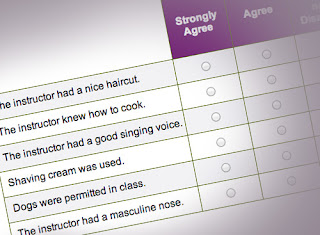- Gender imbalance: female professors are more likely to be judged and evaluated on their looks and for the ways they conform to or counter gender stereotypes than their actual teaching.
- There's a great Storify of experiences with this here.
- Twitter also has a lot of discussions about women and professional dress, #profdress
- There are also multiple studies and articles that cover this:
- Slate's article
- This article discusses a disturbing chart
- For example, female professors in Fine Arts or English are described as "harsh" more than their male counterparts. The same is true of "mean."
- And this one from NCSU talks about the perception of gender on online course evaluations
- Usefulness: if these evaluations are meant to improve student teaching, anonymous evaluations at the end of the semester when you can't ask clarifying questions, or use feedback to improve, do not do what we say we want them to do.
If students see their final grades before they complete evals, is the eval an actual representation of their class experience, or is it an emotional knee-jerk response to a poor grade?
Too, as more universities move to online evaluations, there's a distance. I think it's easier for students to forget that there's a person on the other end of that evaluation. As we've all seen with online communication, whether it's email or social media, it's easier for people to write things that they would think twice before saying to someone's face.
While I think this is less of an issue because I assume we're ethical teachers, and the merit pay is a K-12 argument, the flip side is, we've all had that ONE student who doesn't do well, earns poor grades that we just KNOW, can predict, will go on a vitriolic diatribe on the evaluations.
And that's the only one of these concerns we all just have to live with. Mainly because we're ethical teachers and we're not going to stop giving students the grades they earn/deserve, so that's a non-starter.
I'll start first with addressing the idea of the usefulness of end of semester student evaluations:
- I'm a big fan of informal surveys. I conduct them every four weeks and use Google Forms. The first two are based on the university's end of semester survey.
- Week 4 and 8 surveys
- Week 12 departs from this formula, and is where I ask specific questions about pedagogical issues. While week 4 and 8 are relatively generic surveys, this one is where I ask about specific things I've noticed in class. Therefore it may look very different from class to class.
- In addition to the university surveys the last week of class, I also have the students write a letter to future students.
- These early interventions not only help me identify issues early on but they start a conversation in class. I discuss results with students, explaining what changes I can make, what I can't and why. This not only helps the students see it's their class too but also helps me tailor pedagogy to the students I have.
I am an opinionated female instructor who teaches about feminism, folklore, post-colonialism, social justice, and other gender and social issues. I speak my mind.
In addition to these things, I also counter many students' ideas of gender norms. I wear ties. And jeans. And boots. My work wardrobe is gender neutral, skewing towards male. I don't wear skirts or dresses to work. I don't wear heels. I don't wear much make up. I wear my hair pulled back in a bun.
This, in addition to my attitude and approach means I am often described on evaluations as harsh, mean, and abrasive. In many cases these words are used by students who enjoyed my class, although not always.
I think there are several ways the above issues can be addressed.
- The first is that I think we need to have serious discussions about what these evaluations mean. I think we need to tell students how they are used- in assigning courses for TAs and adjuncts, in tenure promotion for professors, teaching awards, etc.
- Beyond this, I think we need to tell them how we personally use them. I think this is easier to do too if you've already laid the groundwork with your class as to how you value and use reflection and feedback.
- We as instructors have to start front loading our evaluations. We need to share posts/articles like this one, and what I've referenced here. We need to make students aware of gender bias, the impact of it, and how to avoid biased language in their surveys and comments. We need to have these conversations.
- Think about how different things might be if we ALL had this conversation every class, every semester.





No comments:
Post a Comment